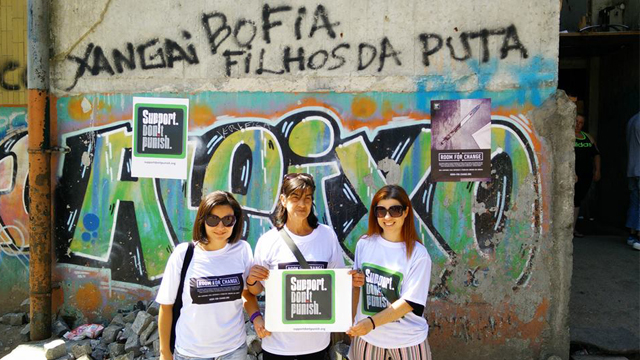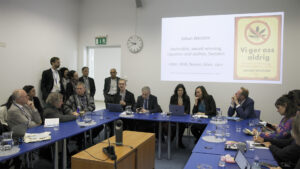A study conducted by the Portuguese harm reduction NGO, APDES, presents how stigma affects the daily lives of drug users.
A little while ago, there was a company hiring drivers. I went there, talked to them, and they said “Joaquim, do you really think I’d hire a junkie?!”
They always get suspicious when I ask to take the methadone away with me. They think, “This guy wants to get money to buy drugs.” It’s always the same, it’s not even worthy it.
Based on humanistic and pragmatic principles, the Portuguese Model of Drug Policy introduced a structural change in the way the State dealt with drug use. For several reasons, however, society as a whole does not always follow these developments. Outreach teams working with people who use drugs (PWUD) frequently refer to the existence of stigma directed at this group.
In order to increase understanding of this phenomenon, APDES led an exploratory and qualitative study that – among other things – aimed to understand those processes of stigma that still persist. Stigma has been analysed as a quality granted to an individual or a group that is deeply derogatory (Goffman, 1986), involving both cognitive reduction processes (which means that the stigmatised identity prevails over other possible identities); and experiential avoidance processes (meaning that the attributed qualities are not confronted) (Fernandes, 1998).
The study involved twenty beneficiaries of GiruGaia, GiruBarcelos and GiruSetúbal[1], APDES’s harm reduction teams. A critical analysis of their daily work was conducted and linked with data from an earlier ethnographic study, carried out between 2014 and 2015, in the very same outreach settings (Rêgo, 2015). The results were presented recently by APDES at the 11th National Congress of Health Psychology (CNPS), held in Lisbon on January 27th.
This population is generally characterised by economic and social precariousness and a long history of use of legal and illegal substances, as well as high-risk practices, family disruption, long-term unemployment, low levels of formal education, and a certain distance from the traditional social and healthcare services.
The main conclusions of the research show that these preconditions favour the emergence, occurrence and reproduction of stigma, thus influencing different aspects of the lives of PWUD, and influencing the work of harm reduction professionals. There are several processes of stigmatisation:
1) Blaming/incriminating PWUD for their health status.
2) Paternalism and secrecy on the part of healthcare services regarding treatment, dosage and urine tests (in contrast to normal practice in terms of other conditions); obstacles presented to dealing with users’ illiteracy, or restrictive criteria applied to the access to certain treatments.
3) Negative treatment, which hinders patients’ access to services; professional staff tend to refuse/present obstacles to health/social care (the main reason why teams choose to accompany their beneficiaries).
4) Difficulty in combining part-time/full-time work with methadone intake, due to the services’ lack of “trust” towards patients, especially in cases where patients ask to take the methadone away with them.
5) The treatment services tend to encompass the teams’ work in the sphere of harm reduction. (I have no idea what this means – jld)
Stigma maintains a distance between the services and the streets, and between normality and deviance, leaving PWUD vulnerable by making them responsible for managing all the risk on their own. Understanding and reporting these processes is a way to give PWUD a voice.
Author:
Research Department-APDES
Translation:
Francisco Azevedo-APDES
[1]Rodrigues, Cláudia; Rêgo, Ximene; Costa, Catarina; Vilares, Joana; Fiães, Alexandra; Homem, Mariana (2016) O Estigma das populações que utilizam drogas: um estudo exploratório a partir do trabalho das equipas de proximidade- Poster apresentado no 11º congresso de Psicologia da Saúde-ISCTE




